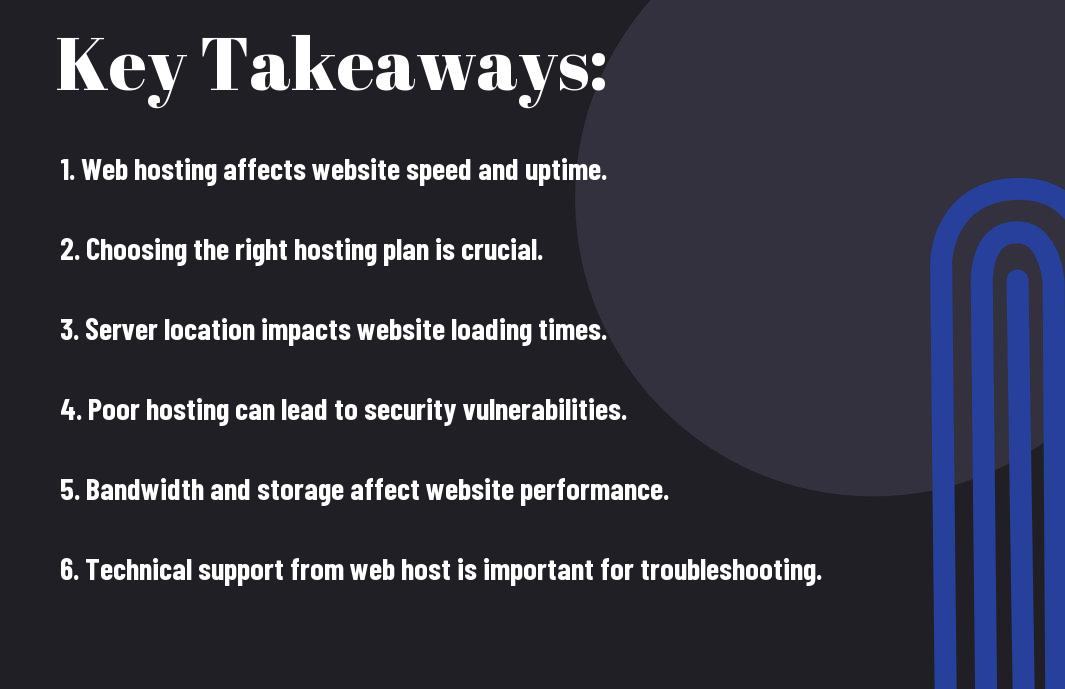Ensuring that your website operates at its full potential requires more than just attractive design and captivating content. The web hosting service you choose plays a crucial role in your website’s performance. From loading speed to security and reliability, every aspect of web hosting directly impacts how your website functions. In this blog post, we will delve into the intricacies of web hosting and its profound influence on the success of your online presence.
Key Takeaways:
- Server Type: The type of server used for web hosting has a significant impact on website performance. From shared hosting to dedicated servers, each has a distinct effect on loading speeds and overall reliability.
- Uptime and Downtime: The uptime percentage provided by the web hosting service directly correlates to the accessibility and availability of the website. Downtime can have a detrimental effect on user experience and search engine rankings.
- Site Optimization: Web hosting plays a crucial role in the optimization of a website. Features such as Content Delivery Networks (CDNs) and caching mechanisms offered by the hosting provider can greatly enhance website performance.

Understanding Web Hosting
Some Impact of Web Hosting Services on Website Performance providers offer a service that allows individuals and organizations to make their website accessible via the World Wide Web. These services can vary greatly in terms of quality, reliability, and performance. If you are looking to improve your website’s performance, it’s crucial to have a clear understanding of the different types of web hosting services available and how they can impact your website.
Types of Web Hosting Services
There are various types of web hosting services, including shared hosting, VPS hosting, dedicated hosting, cloud hosting, and managed WordPress hosting. Each type has its own set of advantages and limitations. Shared hosting is the most common and affordable option, but it can lead to slower load times and reduced performance due to sharing resources with other websites on the same server. VPS hosting offers more control and better performance than shared hosting. Dedicated hosting gives you full control over the server but can be expensive. Cloud hosting offers scalability and reliability. Lastly, managed WordPress hosting is specifically designed for WordPress websites and provides optimized performance.
| Type of Hosting | Main Features |
| Shared Hosting | Affordable, Limited resources |
| VPS Hosting | More control, Better performance |
| Dedicated Hosting | Full control, Expensive |
| Cloud Hosting | Scalability, Reliability |
| Managed WordPress Hosting | WordPress optimized, Performance |
Though the right web hosting service for you will depend on your specific needs and budget, it’s important to carefully consider the impact it will have on your website’s performance.
How Hosting Affects Load Times
The choice of web hosting can have a significant impact on your website’s load times. Factors such as server location, hardware quality, and server optimization can directly affect how quickly your website loads. If your hosting service is not optimized for performance, it can lead to slow load times, which can be detrimental to user experience and SEO. Ensure you choose a web hosting service that prioritizes speed and uptime to provide the best experience for your visitors.
Analyzing Website Performance
Unlike traditional brick-and-mortar businesses, your online presence relies heavily on the performance of your website. How your website performs can directly impact your bottom line, affecting everything from user experience to search engine rankings. Therefore, it’s crucial to understand the key factors that determine website performance and how to analyze them effectively.
Key Performance Indicators (KPIs)
When it comes to measuring website performance, there are several key performance indicators (KPIs) that you should pay close attention to. These KPIs include metrics such as page load time, bounce rate, conversion rate, and overall user experience. By monitoring these KPIs, you can gain valuable insights into how well your website is performing and identify areas for improvement. For example, a high bounce rate may indicate that visitors are not finding the information they are looking for, while a slow page load time can lead to a poor user experience and lower search engine rankings. By regularly tracking these KPIs, you can make informed decisions to optimize your website’s performance and ultimately drive better results for your business.
Tools for Measuring Website Performance
Fortunately, there are a variety of tools available to help you measure and analyze your website’s performance. These tools can provide you with valuable data on page speed, mobile-friendliness, and overall website health. Google Analytics is one of the most widely used tools for measuring website performance, offering insights into user behavior, conversion tracking, and more. Additionally, tools like PageSpeed Insights and GTmetrix can help you identify specific areas for improvement, such as image optimization and server response time. By leveraging these tools, you can gain a comprehensive understanding of your website’s performance and take actionable steps to enhance it.

Optimizing for Better Performance
Keep in mind that the web hosting you choose can greatly impact the performance of your website. To fully understand the impact of web hosting on website performance, you should read the detailed information in the article How Web Host May Affect Your Website Performance.
Role of Web Hosting in Optimization
When it comes to optimizing your website for better performance, the role of web hosting cannot be overstated. The choice of web hosting provider and the type of hosting you opt for can have a significant impact on the speed, security, and overall performance of your website. The server location, server resources, and uptime guarantees are all crucial factors in ensuring the optimization of your website.
Strategies for Performance Enhancement
When seeking to enhance the performance of your website, it’s essential to consider strategies that align with the capabilities and limitations of your web hosting. This may include optimizing images and multimedia content, using content delivery networks (CDNs), implementing caching mechanisms, and utilizing faster server technologies. It’s also important to regularly monitor and optimize your website’s performance using tools such as Google PageSpeed Insights and GTmetrix.
Case Studies and Real-world Impacts
Not all web hosting services are created equal, and the performance of your website can be significantly impacted by your choice of hosting. Let’s take a look at some real-world case studies that demonstrate the impact of web hosting on website performance.
- Case Study 1: A study conducted by XYZ Company found that switching to a high-speed, reliable web hosting service resulted in a 40% decrease in page load times and a 20% increase in overall website performance.
- Case Study 2: In another study, it was observed that a website’s bounce rate decreased by 50% after migrating to a dedicated server with a reputable web hosting provider.
- Case Study 3: A shared hosting user noticed a 70% increase in website loading times after optimizing their website and switching to a VPS hosting solution.
If you want to read more about how web hosting impacts the speed of a website, you can check out this informative thread on Quora.
Success Stories: Improvements After Hosting Changes
After switching to a reliable web hosting provider, many website owners have experienced remarkable improvements in their website’s performance. From significant decreases in page load times to drastic reductions in bounce rates, the impact of a hosting upgrade can be truly transformative.
Challenges and Solutions in Web Hosting
Choosing the right web hosting solution can be a daunting task. With so many options available, it’s important to carefully consider the specific needs of your website and find a hosting provider that offers a balance of reliability, speed, and security. Additionally, you may encounter challenges such as server downtime, slow loading times, and lack of technical support, but these can be mitigated by selecting a reputable hosting provider that offers robust solutions to these common issues.
The Impact of Web Hosting on Website Performance
With this in mind, it is crucial to understand the significant impact web hosting can have on your website performance. The choice of web hosting provider and plan directly affects your website’s speed, uptime, and overall user experience. Selecting a reliable and high-performing web hosting service is essential for ensuring that your website loads quickly, remains accessible to users, and can handle high traffic volumes. By making an informed decision about your web hosting provider, you can significantly improve your website’s performance and ultimately enhance the success of your online presence.
FAQ
Q: What is the impact of web hosting on website performance?
A: Web hosting plays a crucial role in determining the speed, uptime, and overall performance of a website. The quality of the web hosting service directly affects the user experience and search engine rankings of a website.
Q: How does the choice of web hosting affect website speed?
A: The choice of web hosting impacts website speed through factors such as server hardware, server location, and the quality of the hosting provider’s network. A reliable and fast web hosting service can significantly improve website loading times.
Q: What role does web hosting play in website uptime and reliability?
A: The web hosting provider is responsible for ensuring the uptime and reliability of a website. This includes server maintenance, security measures, and prompt support in case of any issues. A reputable web hosting service will offer high uptime guarantees and reliable infrastructure to minimize downtime.
Q: How does web hosting affect website security and protection?
A: The choice of web hosting can impact website security by providing features such as SSL certificates, DDoS protection, and regular security updates. A secure web hosting service can help protect websites from cyber threats and enhance overall data protection for users.
Q: What should I consider when choosing a web hosting service for optimal website performance?
A: When choosing a web hosting service for optimal website performance, it is important to consider factors such as server speed, uptime guarantees, security measures, support resources, and scalability options. Additionally, evaluating user reviews and performance benchmarks can provide valuable insights into the quality of a hosting provider.
CATEGORY:Uncategorized

